Hoboken Shore Railroad
Hoboken Shore Railroad (reporting mark HBS), initials HSRR, was a New Jersey railroad which was created around 1954. It took over the activities of the Hoboken Manufacturers Railroad (reporting mark HMR), initials HMRR. This railroad owned only 0.221 miles (0.356 km) of mainline but leased[1] about 1906 the longer route of the Hoboken Shore Road operated since 1897 by the Hoboken Railroad Warehouse and Steamship Connecting Company, initials HRRWH&SSConCo or HRRW&SSCCO.
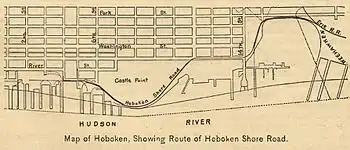 Route map of the predecessor Hoboken Shore Road | |
 Locomotives of the predecessor HMRR around 1930 | |
| Overview | |
|---|---|
| Headquarters | 1419 Bloomfield St, Hoboken |
| Reporting mark | HBS |
| Locale | Hoboken |
| Dates of operation | 1954–1978 (predecessor since 1897) |
| Technical | |
| Track gauge | 4 ft 8+1⁄2 in (1,435 mm) standard gauge |
| Electrification | predecessor 650 V DC till about 1930 |
| Length | 1.411 miles (2.271 km) |
The 1.4 miles (2.3 km) long route of the HBS run along the Hoboken waterfront, serving as a switching and terminal railroad for all connecting carriers between the Erie yard in Weehawken and the Hoboken Piers and a car float transfer bridge. It used electric operation till the 1930s and was abandoned in 1978, after the demise of the Hoboken Piers and decline of traffic.[2]
History
Hoboken Shore Road
In 1784 John Stevens purchased the land of today's city Hoboken from the State of New Jersey. After his death in 1838 his heritage was managed by the Hoboken Land and Improvement Company (HLIC), which held the subsidiary Hoboken Railroad Warehouse and Steamship Connecting Company (HRRWH&SSConCo)[3] founded at September 17, 1895.[4] The railroad began operation as Hoboken Shore Road on September 20, 1897.[5]
Hoboken Manufacturers Railroad
In 1902 the Hoboken Manufacturers Railroad (HMR) was incorporated. Its task was to extend the Hoboken Shore Road further South to connect with the DL&W in Jersey City, what never happened. The 1905 incorporated American Warehouse & Trading Company took control of the HMR. The less than a quarter mile long mainline of the HMR run from the end of the Hoboken Shore Road to the 1st Street and was opened about 1906.[1] In the same year the HMR leased the railroad operation from the HRRWH&SSConCo for 99 years.[6]
When the United States joined the Allies in World War I in the year 1917, the government seized all the piers and properties of German transatlantic shipping companies, namely the Hamburg America Line and the North German Lloyd. Furthermore, the Government bought all the shares of the American Warehouse & Trading Company for 2.45 Mil. $ on July 1, 1917[7] and therefore gained control over the HMR.[6] After the war in the year 1924, it was discussed to sell the railroad to the Port Authority of New York and New Jersey, but it had not sufficient funds for the purchase. Therefore, it got sold in September 1927 to the Hoboken Railroad & Terminal Company[8] owned by the Paul Chapman Company,[7] which sold it in 1932 to Seatrain Lines.[9]
Hoboken Shore Railroad
After the death of Paul Chapman in 1954, the Hoboken Shore Railroad was created. Its 4000 shares were all owned by the HRRWH&SSConCo, which was owned by Webb and Knapp, but was up for sale.[10] Traffic declines when industry and shipping in Hoboken closed or moved to other places. The railroad operated till 1977 and was officially abandoned 1978.[2]
Road Description
The Hoboken Shore Road built by Hoboken Railroad Warehouse and Steamship Connecting Company operated a 1.411 mile long main line, which started from the Erie yard in Weehawken and was running along the shore. The Northern end point was at 18th Street & Park Avenue, the Southern end point was at 5th Street & River Street.[1] From the main line sidings branched of serving the local industry. At the 11th Street a car float transfer bridge was operated, which connected the railroad to the Delaware, Lackawanna and Western Railroad (DL&W).[4] The total network had a length of 7.068 miles.[1]
The Hoboken Manufacturers Railroad operated only 0.221 mile of main line and was therefore called the shortest railroad of US. It connected at 5th Street & River Street to the Hoboken Shore Road and continued South till 1st Street. Furthermore, it owned about 1.375 miles of yard tracks.
Operation
The railroad started shortly after opening to traffic with the electric operation on January 6, 1898.[11] The contact wire was installed at a height of 22 feet (6.7 m) in order to allow the brake men to circulate on the roofs of the freight cars during switching.
By 1911 the railroad had four electric locomotives in operation and switched in a daily 10-hour shift between 100 and 150 cars.[12] Electric operation was ceased in the 1930s when the GE boxcab diesel locomotives arrived.[13] 1938 brought an Alco HH660 series locomotive and 1947 two GE 44 ton switchers.
After World War II traffic declined. By 1954 the railroad had 38 employees and owned 2 shunting locomotives.[10]
Roster
Electric Locomotives
| Road Number | Delivery | Manufacturer | Weight
tons |
Power
hp |
Drawbar pull | Description | Bild |
|---|---|---|---|---|---|---|---|
| 1 | 1898 | GE | 28.5 | 540 | 10,000 lbf (44 kN) at 8 mph (13 km/h) | electric steeplecab locomotive with McGuire trucks[12] | 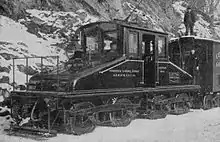 |
| 2 | 1900 | GE | 4-wheeled electric locomotive already phased out in 1911[12] | 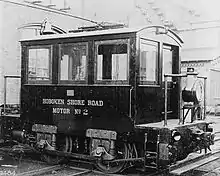 | |||
| 3 | 1906 | Westinghouse | 64 | 400 | 15,000 lbf (67 kN) at 6 mph (9.7 km/h) | Baldwin trucks[12] | 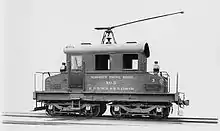 |
| 4 | 1911 | GE | 80 | Alco trucks[12] |
Snow Sweeper
| Road Number | Delivery | Manufacturer | Description | Bild |
|---|---|---|---|---|
| ca. 1898 | McGuire | Snow sweeper | _(14782099153).jpg.webp)
Similar vehicle of the Joliet Railway Company |
Hoboken Manufacturers Railroad
| Road Number | Delivery | Manufacturer | Weight (tons) | Power | Drawbar pull | Builders # | Description | Bild |
|---|---|---|---|---|---|---|---|---|
| 500 | 1928 | GE | 70 | 300 | 10704 | first GE boxcab
diesel locomotive 300 hp model[13] |
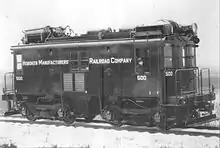 | |
| 600 | 1928 | GE | 108 | 600 | 10705 | first GE boxcab
diesel locomotive 600 hp model[13] |
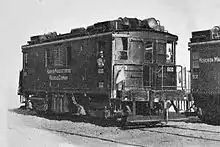 | |
| 601 | 1938 | Alco | 660 | 69086 | Model HH660[2] | 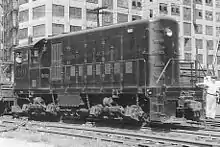 | ||
| 700 | 1947 | GE | 44 | 380 | 26,400 lbf | two Caterpillar engines[10] | 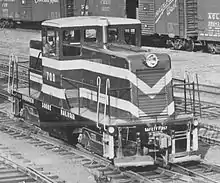 | |
| 701 | 1947 | GE | 44 | 380 | 26,400 lbf | two Caterpillar engines[10] | 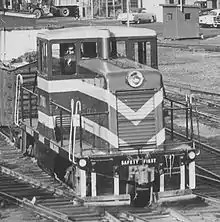 |
Hoboken Shore Railroad
Hoboken Shore Railroad continued to use the 44-ton switchers and also purchased an observation car.
| Road Number | Delivered | Manufacturer | Description | Bild |
|---|---|---|---|---|
| early 1970s[14] | Observation car, former Erie Railroad private car #4, name Hidden Lake; ended up as CACV #4[15] Otsego Lake place in Wortendyke |
[16][17] |
Further reading
- Hoboken Shore Railroad (Sales Brochure). New York: Webb and Knapp (real estate development). 1954.
References
- ICC Reports: Decisions of the ICC of the United States. Valuation reports. U.S. Government Printing Office. 1938.
- Tupaczewski, Paul R. "Hoboken Shore Railroad Home Page". hbs.railfan.net. Retrieved 2009-05-14.
- Richardson Dilworth (2005). The Urban Origins of Suburban Autonomy. Harvard University Press. pp. 121–123. ISBN 978-0-674-01531-9.
- Bernhart, Benjamin L. Hoboken Manufacturers Railroad.
- "Electricity on the Hoboken Shore Road". The Street Railway Review. 8: 57–58. 1898 – via archive.org.
- Sale of Hoboken shore line to Port of New York authority. :Hearings before the Committee on Military Affairs, House of Representatives, Sixty-eighth Congress, first session, on S. 2287 and H.R. 7014. Washington. 1924-01-01. hdl:2027/umn.31951d03573894g.
- "Hoboken Manufacturers Railroad". hoboken.pastperfectonline.com. Hoboken Historical Museum. Retrieved 2016-12-03.
- Smith, Alexander Rogers (1926). The Port of New York, and Ship News. Vol. 6. New York: Port of New York publicity Company. p. 31 – via Google Books.
Hoboken Railroad Sold. A majority of the stock of the Hoboken Manufacturers' Railroad Company has been transferred to the Hoboken Railroad & Terminal Company. This carries with it the sale by the Manufacturers' Railroad Company of ...
- Interstate Commerce Commission v. Hoboken Manufacturers' Railroad Company, 320 368 (USSC) ("In 1932 Seatrain secured control of Hoboken by the acquisition of all of its shares of capital stock ...").
- Hoboken Shore Railroad (Sales brochure). Webb & Knapp. 1954.
- "New Electric Freight Locomotive". The Railroad Gazette. 30 (2): 25. 1898-01-14.
- Electric Traction for Railway Trains. 1911. pp. 310–311. Retrieved 2016-11-27.
- "General Electric/Ingersoll-Rand Oil-Electric Box Cab Diesel Locomotive Roaser". Retrieved 2016-11-27.
- "Hoboken Shore Railroad Homepage: Map Section A". hbs.railfan.net. Retrieved 2016-12-04.
- "Business Car Photo Indexes -Cooperstown & Charlotte Valley". passcarphotos.info. Retrieved 2016-12-04.
- "Picture of obersrvation car owned by HBS". Hoboken Shore Railroad. Retrieved 2016-12-04.
- Testagrose, Joseph. "Delaware Otsego Systems CACV #4 at Wortendyke,NJ". abpr.railfan.net. Retrieved 2016-12-04.